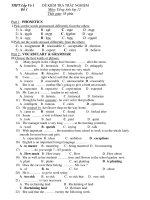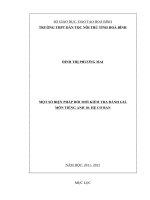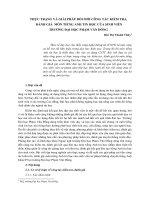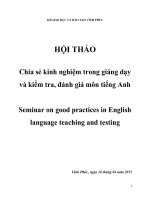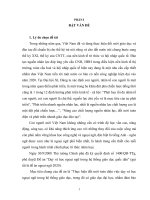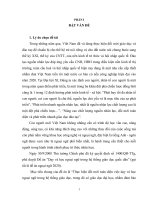Đề kiểm tra - đánh giá môn Tiếng Anh cuối kỳ 1 năm học 2020-2021.
Bạn đang xem bản rút gọn của tài liệu. Xem và tải ngay bản đầy đủ của tài liệu tại đây (326.15 KB, 2 trang )
<span class='text_page_counter'>(1)</span><div class='page_container' data-page=1>
<b>HCMC DEPARTMENT OF EDUCATION </b>
<b>AND TRAINING </b>
<b>TAN TUC HIGH SCHOOL </b>
<b>THE FIRST SEMESTER TEST - ENGLISH </b>
<b>11</b>
<b>Date of testing: Thursday, December 24</b>
<b>th</b><b><sub>, 2020 </sub></b>
<b>Time limits: 60 minutes </b>
<i>Student’s full name: ______________________ Class: ______ ID number: ___________ </i>
<b><sub>Code: </sub></b>
<b><sub>801</sub></b>
<b>A. MULTIPLE CHOICE: (4pts) </b>
<i><b>Choose the word which has the underlined part pronounced differently from the rest </b></i>
<b>1. </b> A. question B. discotheque C. technique D. antique
<b>2. </b> A. given B. risen C. ridden D. whiten
<i><b>Choose the word which is stressed differently from the rest </b></i>
<b>3. </b> A. activity B. organize C. stimulate D. difficulty
<b>4. </b> A. method B. women C. something D. support
<i><b>Choose from the four options given (marked A, B, C, and D) one best answer </b></i>
<b>5. </b> <i><b>The transition from school to work does not happen smoothly to everybody. (closest meaning) </b></i>
A. without difficulties B. full of troubles C. with problems <b>D. plenty of challenges </b>
<b>6. </b> <i><b>I regretted not buying those trendy shoes because of lack of money. (opposite meaning) </b></i>
A. shortage B. abundance C. scarcity <b>D. deficiency </b>
<b>7. </b> We have to protect our country’s natural ____________ , such as coal, oil, and forests.
A. population B. resources C. rates D. method
<b>8. </b> A(n) _________ is someone who takes part in sports competitions.
A. judge B. organizer C. athlete D. sponsor
<b>9. </b> These days, many large families are struggling to ____________
A. make ends meet B. call it a day C. tighten the belt D. break the ice
<b>10. </b> <b>Luke: “When is the class party?” Alice: “_____.” </b>
A. Every morning B. Next Saturday C. Once a week D. Last Sunday
<b>11. </b> The teacher explained the rules of the competition ______ the students very carefully.
A. to B. with C. for D. about
<b>12. </b> It is _____ time governments and organization did something to control birthrate.
A. a B. an C. the D.
<i><b>Find the underlined part in each sentence that should be corrected </b></i>
<b>13. </b> There were (A) so much (B) books in the library that (C) I didn’t know which one to choose D).
<b>14. </b> They spoke few (A) English, so (B) it was difficult for us (C) to communicate with (D) them.
<b>15. </b> If I will have (A) to make (B) a difficult decision, I will discuss (C) it with (D) my friends
<i><b>Read the passage carefully and choose the correct answers </b></i>
Basic to any understanding of Canada in the 20 years after the Second World War is the country's impressive population
growth. For every three Canadians in 1945, there were over five in 1966. In September 1966 Canada's population passed
<b>the 20 million mark. Most of this surging growth came from natural increase. The depression of the 1930's and the war had </b>
held back marriages, and the catching-up process began after 1945. The baby boom continued through the decade of the
1950's, producing a population increase of nearly fifteen percent in the five years from 1951 to 1956. This rate of increase
had been exceeded only once before in Canada's history, in the decade before 1911, when the prairies were being settled.
Undoubtedly, the good economic conditions of the 1950's supported a growth in the population, but the expansion also
derived from a trend toward earlier marriages and an increase in the average size of families. In 1957 the Canadian birth
rate stood at 28 per thousand, one of the highest in the world.
After the peak year of 1957, the birth rate in Canada began to decline. It continued falling until in 1966 it stood at the
lowest level in 25 years. Partly this decline reflected the low level of births during the depression and the war, but it was
also caused by changes in Canadian society. Young people were staying at school longer; more women were working;
young married couples were buying automobiles or houses before starting families; rising living standards were cutting
down the size of families. It appeared that Canada was once more falling in step with the trend toward smaller families that
had occurred all through the western world since the time of the industrial Revolution.
Although the growth in Canada's population had slowed down by 1966 (the increase in the first half of the 1960's was
only nine percent) another large "population wave was coming over the horizon. It would be composed of the children of
the children who were born during the period of the high birth rate prior to 1957.
<b>16. </b> <i><b>What does the passage mainly discuss? </b></i>
A. Educational changes in Canadian society B. Canada during the second World War
C. Population trends in postwar Canada <i><b>D. Standards of living in Canada </b></i>
<b>17. </b> <i><b>According to the passage, when did Canada's baby boom begin? </b></i>
A. In the decade after 1911 <i><b>B. After 1945 </b></i>
C. During the depression of the 1930's <i><b>D. In 1966 </b></i>
<b>18. </b> <i><b>The word "surging" is closest in meaning to ________________. </b></i>
</div>
<span class='text_page_counter'>(2)</span><div class='page_container' data-page=2>
<b>19. </b> <i><b>The author mentions all of the following as causes of declines in population growth after 1957 EXCEPT: </b></i>
A. People being better educated B. People getting married earlier
C. Better standards of living D. Couples buying houses
<b>20. </b> <i><b>It can be inferred from the passage that before the Industrial Revolution ____________. </b></i>
A. Families were larger B. Population statistics were unreliable
C. The population grew steadily <i><b>D. Economic conditions were bad </b></i>
<b>B. WRITING (6pts) </b>
<i><b>Fill in each numbered blank with one of the words given: </b></i>
<i><b>especially – event – international – such – who – national – which - so </b></i>
A music competition is an <b>(1) </b>__________ in which people compete for prizes by performing music. Music
competitions can be for solo performers or for small or large groups <b>(2) </b>________ as orchestras, bands or choirs. Some
competitions are for young people who are starting to make a professional career in music. Other music competitions
may be for amateurs, <b>(3) </b>________ means that professional musicians are not allowed to compete.
There are many big <b>(4) </b>_________ competitions for some of the most talented musicians from all over the world.
Winning a big competition can help a young musician to start a successful career. Some people think it can also be a
bad thing to win a big competition, <b>(5) </b>_________ for musicians who are still very young. It may make them a star
for a short time but they still have to get better and mature as a musician and a person.
<i><b>LISTEN and complete the questions: </b></i>You will hear a man asking for information about the Westwood English School.
<b>WESTWOOD ENGLISH SCHOOL </b>
Evening classes on: Thursday
Next course starts on: <b>6</b>
<b>22 ………..………… </b>
Speaking class with: <b>7</b>
<b>Miss ………. </b>
Cost for 12 classes: <b>8</b>
<b>£ ……….. </b>
Address: <b>9</b> <b><sub>………Fitzroy Square </sub></b>
School is next to the: <b>10</b> <sub>……… </sub>
<i><b>Give the correct VERB TENSE in the brackets in each sentence </b></i>
<b>11. </b> <b>We __________ a surprise party for my brother last Saturday.( throw) </b>
<b>12. </b> <b>You __________ up with the excuse for not having done your homework. It’s so annoying.(always/ come) </b>
<b>13. </b> <b>My mom was very angry because my sister__________ her room.( not/ clean) </b>
<b>14. </b> <b>In the future, I think humans __________ out many different species. (wipe) </b>
<b>15. </b> <b>Physics__________ one of the most important subjects in Vietnam.( be) </b>
<i><b>Give the correct VERB FORM in the brackets in each sentence </b></i>
<b>16. </b> <i><b>He spends hours _________ to repair his car. (try) </b></i>
<b>17. </b> <i><b>You’d better _________ what you think in front of the conference. (say) </b></i>
<b>18. </b> <i><b>The secretary refused ___________ on Sunday. (work) </b></i>
<b>19. </b> <i><b>My father has our house _____________ every year. (whitewash) </b></i>
<b>20. </b> <i><b>Six months after the accident, he still has difficulty ____________ . (walk) </b></i>
<i><b>Give the correct WORD FORM in the brackets in each sentence </b></i>
<b>21. </b> <i><b>They raced fairly and _____________, and had a good relationship. (compete) </b></i>
<b>22. </b> <i><b>She has an ________________ temper. (explode) </b></i>
<b>23. </b> <i><b>We are __________________ in a live debate on television. (participate) </b></i>
<b>24. </b> <i><b>He was chosen to ________________ France at the Olympics. (representation) </b></i>
<b>25. </b> <i><b>________________ is a serious problem the world needs to deal with. (population) </b></i>
<i><b>REWRITE the following sentences as directed </b></i>
<i><b>26. </b></i> <i><b>“I imagine I’ll see Olivia at the party.” He wanted ... </b></i>
<b>27. </b> <i><b>“If I were you, I ‘d read the exam questions very carefully.” He advised ... </b></i>
<i><b>28. </b></i> <i><b>“I didn’t break the windows.” Bill said. Bill denied ... </b></i>
<b>29. </b> <i><b>You can’t run out of the garden,” Ms. Kelly said to the children. Ms. Kelly prevented ... </b></i>
<b>30. </b> <i><b>“If I catch the plane, I’ll be home by five,” he said. He said ... </b></i>
</div>
<!--links-->

